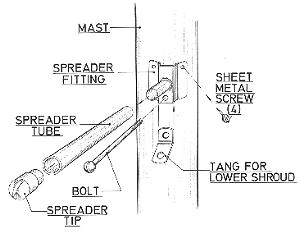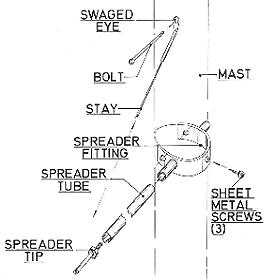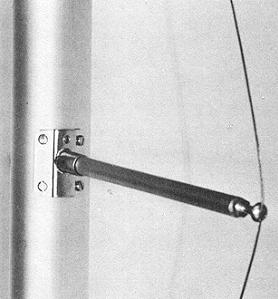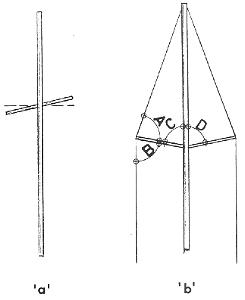Rigging Small Sailboats
Chapter 8
.....outfitting spars
Page 3POSITIONING STANDING RIGGING ON MAST
The approximate locations for the attachment points for all the stays and shrouds must be ascertained, either from the plans, or from the spar manufacturer. If the shrouds and stays have already been purchased, this means the attachment points must be located to suit. Otherwise, the builder must determine the lengths required directly from the work. In this case, strings can be attached to the mast, the mast erected temporarily in position, and the lengths determined with the strings. If the stays and shrouds are already purchased, they must be taped or clamped in approximate position on the mast, and the mast temporarily erected. If the stays or shrouds have turnbuckles, these should be set at the midpoint. If the stays and shrouds are long or short in this position, determine the distance and merely shift them along the mast to suit. On boats which use both upper and lower shrouds, first determine the position of the lower shrouds in this manner. The position of the lower shrouds on the mast is also the point of the spreader fitting because these fittings are usually incorporated (see Figs. 8-8, 8-9, and 8-10).
 8-8 |
 8-9 |

|
FIGS. 8-8 through 8-10 - Two types of spreaders used on aluminum spars are shown. Either type does not pass through the spar. Those shown in Figs. 8-8 and 8-10 can be used on wood masts also. Usually there is a built-in "rake" or angle to the fitting for the spreaders. The lengths of the spreaders can be varied by varying the length of the tubes. That shown in Fig. 8-9 is a type used with diamond stays and does not have any rake built in. Tension is varied in the stay by adjusting the spreader tips in or out. 8-10 |
When spreaders are used, these must be positioned before fixing the upper shrouds to the mast. Often the position of the spreaders is given "approximate only" by the designer. On hollow wood spars, there should be a length of solid blocking in the mast to allow the spreaders to be shifted up and down the mast several inches as required to suit the length of the stays. On aluminum spars, the spreaders may attach to fittings that screw fasten to the side of the mast, or the spreader fitting may be bolted through the mast. The spreader fittings must align with each other, on each side of the mast, so the force is equalized (see Fig. 8-11). Don't mount one slightly off center from the opposite one. If the fitting is through bolted and an oval mast section is being used, be sure to drill the hole at the widest cross sectional dimension of the spar and at right angles to the longitudinal centerline of the mast cross section. Use a tape measure clipped at the bolt rope groove and wrapped around the girth of the mast to determine the correct point on each side. Then drill the hole from the outside on each side in order to insure that the spreader bolt will align correctly in the mast and be at right angles to the centerline of the boat.

|
FIG. 8-1 I - Spreaders should not be "cocked" or canted from each other. They should be exactly opposite each other to counteract equally the forces imparted to them. When spreaders are raked, ideally Angle "A" should be equal to Angle "B", while Angle "C" and Angle "D" must be equal. |
Some spreaders are mounted so they are horizontal with the waterline. Other spreader fittings are "raked" so the angle formed along the upper shrouds by the spreaders is practically equal (see Fig. 8-11'b'). If the spreader fittings you have are raked, be sure that the rake goes UPWARDS. If the spreaders prove to be too long, most often they can be trimmed off to the desired dimension. Note however, that the dimension of the spreaders out from the mast should be the same on both sides.